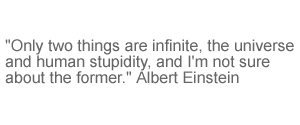







Techscape: Vint Cerf mulls the future
The Register , 16.09.05
By Bill Robinson
Interview In the third of TechScape's three exclusive interviews with Vint Cerf, Bill Robinson asks the man to look into the future...
Sir Arthur C. Clarke's name came up more than once during my conversations with Vint Cerf, and justifiably so. Arguably the greatest sci-fi writer of all time (only Asimov fans have the temerity to challenge the Clarke supremacy), Sir Arthur has worked very closely with NASA and other space agencies in mankind's exploration of the cosmos while accurately predicting such technological strides as the emergence of geosynchronous communications satellites decades in advance.
Cerf, as we've learned, also has been involved in space exploration mainly in the evolutionary process of setting up his InterPlaNet.
Clarke is known as a visionary, and during my interview with him made some fascinating predictions about his environmental worries about Earth, the Space Elevator and Brain Cap. So our final conversation with Vint Cerf outlines his ideas of what our world may look like in the future.
When I opened by mentioning Clarke's Brain Cap - literally, a cap connecting directly into the cerebral cortex and providing direct mental stimulation - Cerf wanted to know more. When I told him Clarke had said we could have any experience imaginable from touring the Louvre to scuba diving in Sri Lanka or having carnal relations with a supermodel but that his concern was that this would “turn us all into the ultimate couch potatoes”, Cerf took the bait.
“We already have the ability to fool the brain,” he started. “My wife has a cochlea implant which allows her to hear in this way. The inner ear has small hairs rooted in fluid and when tympanic responses from sound goes through three small bones the hairs vibrate, or oscillate in sympathy, at different speeds finally sending signals into the brain for interpretation. The device simulates this process allowing her to hear.”
“What I find most fascinating,” Cerf continued, already thinking decades ahead, “is whether we will ever learn to understand the process of cognition and the inner-workings of the brain. Something such as memory and how the brain stores, retrieves and recognizes it is a total enigma at this point.”
Our dependence on computers, PDA's and other devices “is scary”, Cerf added anxiously. “Recent estimates say there are more than 150 million zombies out there. This is the dark side of the future technologically - the vulnerability of the network.”
In 20 to 30 years Cerf predicts, we'll have many more orbiting astronauts for much longer periods; permanent systems on Mars where he is excited about the potential for sustainable life. “We've seen clear indicators of life in recently discovered underground ice formations,” he said optimistically.
One of the technological challenges Cerf and others are working to overcome is that, surprisingly the radios in spaces are overheating. “When their temperature hits 30 to 40 degrees Celsius, they can breakdown entirely,” he said. “The question we've asked ourselves is could we reprogram the rover to uplink data to the Mars Odyssey satellite to hold it there? The ‘store & forward' strategy has resulted in significantly larger amounts of data being received and processed.”
What's the bigger picture for space communications?
“Once we standardize these communications protocols,” Cerf pointed out, “each mission will be helping to build another piece of this space communications backbone. Right now, there are over 300 international spacecraft using communications standards we've developed.”
Here on Earth and out in space, communications would seem to be important if we need to defend ourselves from enemies. What's Cerf's take on this?
“Network-centric warfare information is very important in the battlefield environment,” he stressed. “Overhead satellite assets can provide crucial information to forward assets.” Potentially winning the war? “Absolutely,” Cerf said vigorously. “The communications system has to be ultra-robust; otherwise your communications system becomes a real vulnerability.”
I asked Cerf if he had seen the Terminator movies and in particular the part where the computer chip was the central target for destruction and preventing a nasty future. He responded affirmatively. Did he think the premise that increasingly intelligent machines would eventually try to take over the planet from us feeble humans was realistic? Could the machines run amok?
He countered by asking me if I had seen one of his favorite movies (and mine certainly), Isaac Asimov's Bicentennial Man with Robin Williams.
When I said yes, Cerf said: “Do you remember the scene when the robot named Andrew is taken back to the manufacturer and the concerned executive observes that the robot 'might run amok?' 'One is not qualified to run moks,' the robot responds."
Cerf chuckled and continued: “That nightmare is hard to predict. We could even argue a scenario where the internet is a nascent platform for a connection to be made for the machines to take over. It's not the hardware that's important, but the software.”
Other possibilities, according to Cerf, include clothing made with sensors built-in to monitor people's biological data; and water purification technologies such as desalination and aquifers which were developed for space will be “extremely beneficial”.
Would Cerf want to go on a space mission to Mars, as former US Senator and astronaut John Glenn did at the ripe old age of 77? Is he lobbying for this opportunity?
“Funny you should mention that,” Cerf replied. “I met John Glenn and his wife Annie at a White House reception a while back and we talked about this idea.”
So, would Cerf go?
He evaded a direct answer probably for fear of his wife's reaction but did decoy me with: “It was clear from my conversation with John at that time, that if an invitation came to John to go to Mars, he would go and Annie would understand.”
On another tangent, was Sir Arthur exaggerating and distressing needlessly about the ecological damage being done to our planet?
In a recent issue of Scientific American, Cerf found compelling questions with regard to this planet's sustainability or collapse by the year 2050. This issue projected population growth and diminution (in the case of Russia ) then stabilization by mid-century at around nine billion. Cerf said he had predicted a few years ago that figure would be 11 billion, so he was pleasantly surprised but still concerned. “Another surprise,” he said, “was that in 2050 the leading killer will be heart disease.”
“Sir Arthur's concern was very real,” Cerf concluded gloomily, “very real indeed.” ®
Copyright © 1994 - 2005 Relentless Marketing